

Agroforestry: A solution to farming’s biggest problems? These Pools Help Support Half The People On Earth. Madre Semilla – Red de Aprendizaje Regenerativo.
Fleet Farming - A Bike-Powered Urban Farming Program. Our Mission is Transfomation – At GrowingChange.Org we are transforming closed prisons into sustainable farms and educational centers to reclaim opportunities, attain education, and sustain personal and environmental wellness for troubled youth, returning. Permaculture & Biodynamic Farming. Heirloom seed suppliers. Urban gardening. Fungus Could Be the Key to Avoiding a Global Food Crisis. Getty Our world is sitting on a time bomb.
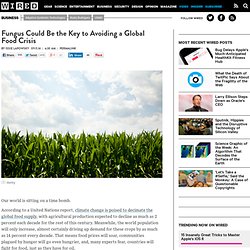
According to a United Nations report, climate change is poised to decimate the global food supply, with agricultural production expected to decline as much as 2 percent each decade for the rest of this century. Meanwhile, the world population will only increase, almost certainly driving up demand for these crops by as much as 14 percent every decade. That means food prices will soar, communities plagued by hunger will go even hungrier, and, many experts fear, countries will fight for food, just as they have for oil.
The good news is unorthodox companies like Adaptive Symbiotic Technologies are working to reverse this harrowing trend. After spending decades perfecting and field-testing the formulation, Adaptive is preparing to bring BioEnsure to market this fall. Over Grow The System. Barnraiser. When Less is More; Farmers Are Reaping the Benefits of No-till Agriculture. With no-till agriculture, farmers avoid disturbing the soil through tilling or plowing.
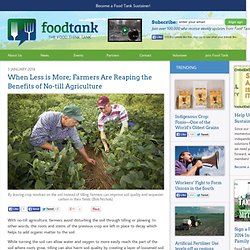
In other words, the roots and stems of the previous crop are left in place to decay which helps to add organic matter to the soil. While turning the soil can allow water and oxygen to more easily reach the part of the soil where roots grow, tilling can also harm soil quality by creating a layer of loosened soil (which will easily compact again under rainfall) over a deeper layer of compacted soil where the roots need to grow. Tilling can also lead to the loss of valuable organic matter, soil erosion from water or wind, and, according to the U.S. Department of Agriculture (USDA), the accelerated loss of carbon dioxide. Organic farms produce same yields as conventional farms. Organic farming produces the same yields of corn and soybeans as does conventional farming, but uses 30 percent less energy, less water and no pesticides, a review of a 22-year farming trial study concludes.
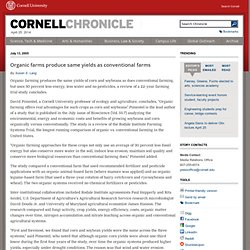
David Pimentel, a Cornell University professor of ecology and agriculture, concludes, "Organic farming offers real advantages for such crops as corn and soybeans. " Pimentel is the lead author of a study that is published in the July issue of Bioscience (Vol. 55:7) analyzing the environmental, energy and economic costs and benefits of growing soybeans and corn organically versus conventionally. The study is a review of the Rodale Institute Farming Systems Trial, the longest running comparison of organic vs. conventional farming in the United States.
Inter-institutional collaboration included Rodale Institute agronomists Paul Hepperly and Rita Seidel, U.S. Among the study's other findings: A Time for Foie. What is the Ethical Choice for People, Animals and Planet? How to feed the world in 2050: actions in a changing climate. Farming and knowledge monocultures are misconceived. Food needs can be met with a new vision for agriculture and science, say Brian Wynne and Georgina Catacora-Vargas.
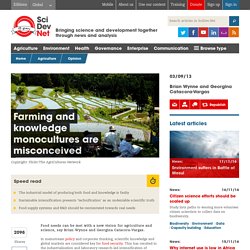
In mainstream policy and corporate thinking, scientific knowledge and global markets are considered key for food security. This has resulted in the industrialisation and laboratory research-led intensification of agricultural systems, inputs and food-supply chains. But intensified systems do not meet global food needs — they mostly suit export markets and corporate interests. Gardeners Sharing Their Harvest With A Community Food Pantry. How farmers can help fight climate change. The other week, I spent some time interviewing several business leaders for the North Carolina Sustainability CEnter, asking them about their reactions to President Obama's climate speach.
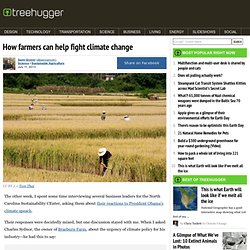
Their responses were decidedly mixed, but one discussion stayed with me. When I asked Charles Sydnor, the owner of Braeburn Farm, about the urgency of climate policy for his industry—he had this to say: "As a farmer, when we look at climate change there are two sides to the story – but we only really talk about one – namely the production of greenhouse gases. Yet agriculture should be part of the solution.
I can take you to places right now where crops are grown year-after-year-after-year without tilling the land, and where there is increased carbon sequestration year-after-year. Sydnor has a powerful point. No-till farming NRCS Soil Health/CC BY 2.0 Soil has the potential to store huge amounts of carbon. Producing renewable energy. Vitality for People and the Planet. Agricultores ecológicos. Encuentra agricultores y consume productos locales, frescos y de temporada.
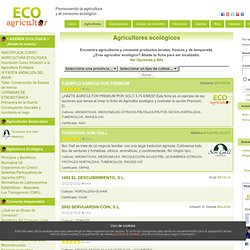
¿Eres agricultor ecológico? Añade tu ficha para ser localizado.Ver Opciones y Alta ¡¡HAZTE AGRICULTOR PREMIUM POR SOLO 3,75 €/MES!! Esta ficha es un ejemplo de las opciones que tienes al crear tu ficha de Agricultor ecológico y contratar la opción Premium. El... ECO agricultor - Agricultura Ecológica. GRAIN — Home. Agriculture. Growstuff. Www.centrosachamama.org. Sachamama Center for BioCultural Regeneration (SCBR) is a non-profit organization in the Peruvian High Amazon in the town of Lamas, Department of San Martin, dedicated to the biocultural regeneration of the region in collaboration with the indigenous Kichwa-Lamistas, the descendants of pre-Columbian inhabitants, as well as with the local Education Board of the district of Lamas (Sp. acronym UGEL).
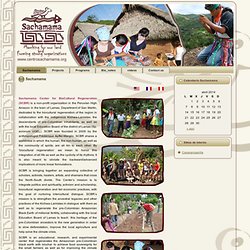
SCBR was founded in 2009 by the anthropologist Frédérique Apffel-Marglin. PJ in the Owens Valley: the Indigenous Farming Project. Growing Power. SUSTAINABLE FOOD CENTER. A Foundation for Food Security. Sustainable Food Lab: Sustainable Food and Agriculture Systems Sustainable Food Laboratory. SAFSF.ORG :. Sustainable Agriculture & Food Systems Funders.